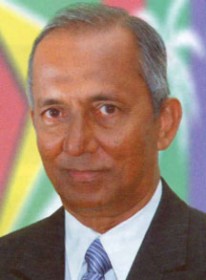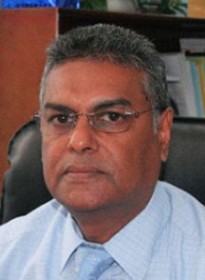-Opposition concerned about some provisions
The government last evening passed the New Building Society (Amendment) Bill despite calls by the opposition for it to be deferred or sent to a select committee because of concerns over some of its provisions.
(Editor’s note: The earlier version of this story had erroneously said that the bill was sent to a select committee. Stabroek News regrets the error.)

During yesterday’s debate both the PNCR-1G and the AFC indicated their general support for the bill which aims to bring the New Building Society Limited (NBS) under the direct supervision of the Bank of Guyana (BoG) to improve its regulation. However, both parties passionately expressed concern that some of the amendments were proposed without the approval of the Society’s shareholders and that some of these measures were being undertaken to silence some of the vocal shareholders of the Society.
Finance Minister Dr Ashni Singh, while piloting the bill through the House, said that the piece of legislation was aimed at ensuring that all financial institutions in the country were part of a modern and robust regulatory framework. He, however, emphasized that this move by the administration was not a suggestion that the NBS was not being managed adequately. Singh said that this was a plan that was on the agenda for a long time and that it was “already widely embraced.”

Shadow Finance Minister Winston Murray contended that sections of the bill ought to have been brought before the National Assembly as a Private Bill, in the same manner the original piece of legislation in 1940 was. He said too that it did not appear as if the Minister had conducted consultations with the shareholders of the society. Murray also queried the rationale of raising the number of persons who could request a Special Meeting of the Society from 50 to at least 10, 000 persons.
Murray said too that he had concerns about the propose amendment which states that the “Society shall benefit from the exclusion of taxes on earnings, waiver of licensing fees and reserve requirements”. According to him, the reserves of a financial institution are very important especially in times when there may be financial difficulties and a possible run on the institution may result.
The Shadow Finance Minister told the House that he was aware that some members of the Society were requesting that the bill be deferred and he urged that this be done in the interest of transparency. Murray said too that if the government was not willing to defer the bill, it should be sent to a Select Committee, where the various stakeholders would have an opportunity to make their contributions.

Labour Minister Manzoor Nadir echoed the view that bill was aimed at improving regulation of the NBS. He also argued that by tabling such legislation, the Finance Minister was giving up a lot of control of the Society with which he is presently endowed. Nadir pointed out too that the Society had over $40 billion in assets.
Nadir argued too that the Opposition was trying to have the Society respond to the bullying minority instead of the vocal majority. According to him, the proposed changes in terms of the number of members who may requisition a special meeting from 50 to approximately 10,000 took into consideration the reality of the NBS. He said that when the Principal Act was passed in 1940, the society was a small one where 10 percent of the shareholders would have represented 50 people. He argued that today 10 percent of the membership of the NBS would be at least 10,000.
Entrenching

Alliance For Change MP Khemraj Ramjattan charged that the bill was aimed at “empowering and entrenching” the board members who were close friends of the administration. He noted that while his party supported a majority of the proposed amendments, there were some which were a “degradation of good governance” and were aimed at “outfoxing” certain persons.
Regarding the move to increase the number of members who could requisition a special meeting of the Society, Ramjattan said by introducing the clause about 10 percent of the Society’s membership, an element of vagueness was introduced as to exactly how many persons this represented.
He said too that this did not reflect transparency. He said that if the Society has good scrutinizing members, even if these were a minority it would help.
He noted that the NBS was now a large financial institution in the country and suggested that the government was behaving like the PNC used to do while it was in power trying to “nationalize” any company or entity that was “big”.
Dr Singh argued that the piece of legislation proposed that the NBS be exempted from reserve requirements since the Society is fully secure with legal mortgages and immovable assets. He also rebuffed suggestions that the bill ought to be brought as a Private Bill, and argued that bringing it before the House in that form was in keeping with the Parliamentary Standing Orders.
Prior to the bill being debated in the National Assembly, some members of the Concerned Members of the New Building Society (NBS) wrote to the Director/ Secretary of the NBS Ahmad Khan requesting that a Special Meeting of the Society be held.
While supporting the proposal to have the NBS brought under the supervisory control of the Bank of Guyana, the Group indentified several clauses which were of concern to the group. In the letter, the group elaborated on the concern they had about regarding each identified clause. Several members of this group including; Chartered Accountant Christopher Ram, Ramon Gaskin, Norris Witter and Cyril Walker were present during yesterday’s sitting of the Assembly.

